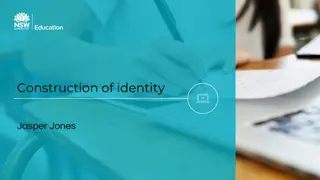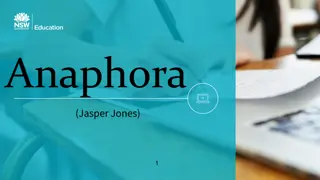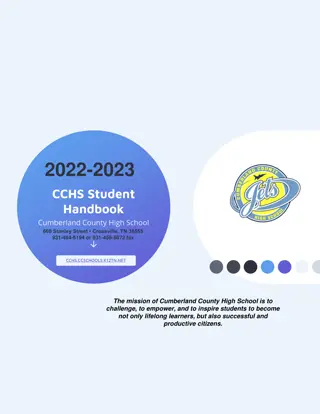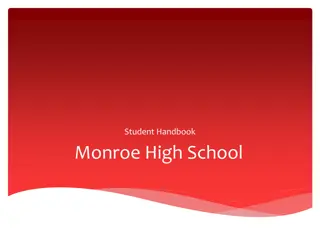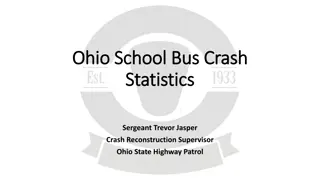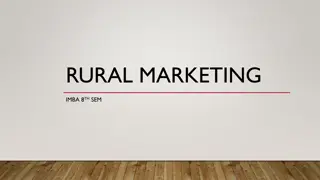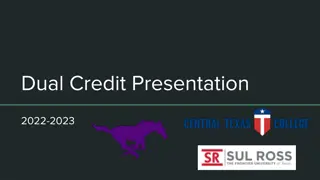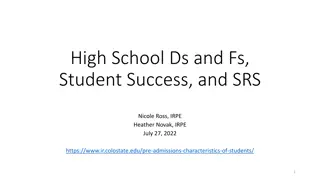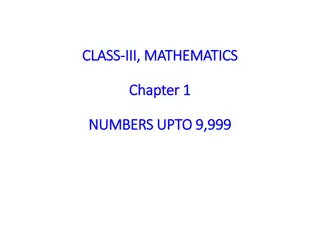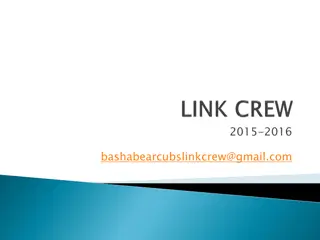Effective Study Strategies for Success at Jasper Place High School
Develop strong study habits, note-taking skills, and organizational techniques to enhance your academic performance at Jasper Place High School. Stay organized with a student planner, take effective notes, and engage actively in class to succeed in your studies. Learn how to prioritize important information, use shorthand for note-taking, and pay attention to cues from teachers for better understanding and retention of key concepts.
Download Presentation

Please find below an Image/Link to download the presentation.
The content on the website is provided AS IS for your information and personal use only. It may not be sold, licensed, or shared on other websites without obtaining consent from the author. Download presentation by click this link. If you encounter any issues during the download, it is possible that the publisher has removed the file from their server.
E N D
Presentation Transcript
The Objective To provide tips to assist you in developing strong study habits, note taking strategies, and study skills in order to become a successful student at Jasper Place High School.
Study Skill #1: Stay Organized Use a student planner or personal journal every day. Tip: Write in assignments even if they are posted on a teacher s website or assignment sheet. You can see everything you have to do. Keep papers and notes from each subject separate. Tip: If you put all your papers in one folder, try using an accordion file to separate by class. Do not throw away old homeworks, tests, and quizzes. Tip: If you have too many papers, leave older papers at home in a safe place. If you are unorganized, ASK FOR HELP Tip: If you have papers all over your book bag and sticking out of notebooks, you are unorganized.
Study Skill #2: Note Taking The ability to take good notes will help you Earn better grades Understand the lesson Perform better on quizzes Have better material to study before tests Stay focused in class!
Note Taking Many students take notes, but few take good notes. How do you take good notes? Have a designated place for class notes for each subject. Be ready when class starts. Always write the date at the top of the page where you write your notes. If your teacher puts notes on the board or power point, remember to LISTEN while you copy notes. If you miss some notes or don t finish copying notes, write a star on your paper or reminder to yourself to get the notes from a classmate
Note Taking Learn how your teacher indicates what s important. Listen for key words like: main idea, cause and effect, turning point, theme, important Proper nouns and dates Vocabulary words with definitions Take notes on your own when you read your homework. You will read more carefully You will have some notes to study before class and possible quizzes. You will have more notes to study before a test.
Note Taking in Class - General Tips Note taking keeps you actively engaged in class Don t try to write notes word for word Use shorthand to write down main ideas Writing down material is important but listening and analyzing is just as important Pay attention to cues from the teacher pausing for emphasis, restating a point, saying you ll see this again Pay attention to details material written on the board, shown in a PowerPoint, etc., are things to put in notes
Lets Practice Now Take out a scratch piece of paper. Practice writing notes from the blurb I read below. Let s Practice Now The second World War was a global military conflict which involved a majority of the world s nations, including all great powers. The war involved the mobilization of over 100 military personnel, making it the most widespread war in history. Over seventy million people, the majority of whom were civilians, were killed, making it the deadliest conflict in human history.
Discussion Discussion - - Let s Let s Debrief Debrief Share some of the shortcuts you took when writing down your notes What key points did you record? What facts do you think the teacher may ask you on an exam?
Note Note Taking Taking - - The The Cornell Method Cornell Method The Cornell Method is a widely used note taking system invented in the 1950s at Cornell University. The system not only keeps your notes organized, but also creates a study guide within itself. This method is preferred by most law schools.
Cornell Method - Set up your paper 1. Address your paper like you normally would any other paper. (Include name, date, and class period). 2.Draw lines on your paper to make it look like the picture on the right. Prepare pages before class if possible. 3.It doesn t need to be perfect, just as close as you can get.
Cornell Method - How to use it Take notes like you normally would on the right side of the vertical line Continue to take notes on as many pages as you need until the lecture is complete After the lecture, go back and give headings to your notes to make topics easier to find when you study Always take notes here. Summarize each section of your notes into only a few words
Cornell Method - The Five Rs Step 1: RECORD Take notes on the right side of the page Step 2: REVISE Label your notes in short, easy to find phrases in the left column of the page Step 3: RECITE Cover the right side of the page with a sheet of paper. Using the phrases on the left quiz yourself. Say everything you know about the phrase of word in the left column ..NOW, YOU RE STUDYING!!!
Cornell Method - The Five Rs Step 4: REFLECT Reflect on the material by asking yourself questions What s the significance of these facts? What principles are these based on? How can I apply them? How do they fit in with what I already know? Step 5: REVIEW Reread your notes daily so you don t have to cram the night before
Studying Review your notes from class, homework and quizzes, especially what you got wrong. Go through textbook and do practice questions. Make a review sheet or flash cards. Writing reinforces information and you have an quick way to study before the test. Keep track of questions you have to ask teacher or classmates.
Studying (cont) Study with a strategy. Plan breaks. Study first on your own, then try a study group. Avoid cramming. Start studying 2-3 days in advance. Avoid studying in front of a computer, with your cell phones, or with TV, iPod, radio
Test Taking Low grades on tests and quizzes can be caused by Poor study habits: Not studying enough only the night before or day of Just reading over notes repeatedly, and not digesting information in a variety of ways (review sheets, flash cards, doing problems, reviewing homework and quizzes) Lack of preparation : Not doing all the homework in weeks before test. Trying to learn everything right before the test. Fear of failure; Pressure to get a good grade Low expectations; Comparing yourself to others
Test Taking Strategies Before answering a single test question, read the directions Be aware of time limits Read all of the answers before selecting one Make sure an essay answers the question Quality not quantity


